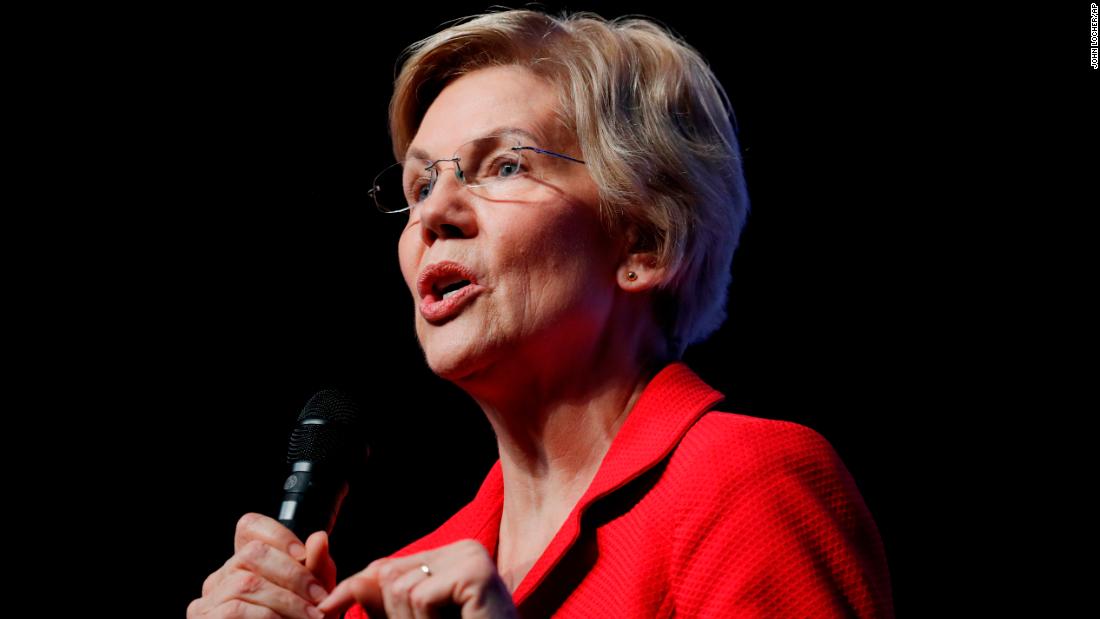[ad_1]
At a restaurant in Council Bluffs, where the Massachusetts Democrat held her first town hall with voters, she was prompted by a reporter to reflect on being a female candidate for president. Warren offered up a response that did not address her gender.
“I’d never run for office before 2012. What pulled me in is what’s happening to working families across this country,” she said. “That is the reason I am in the fight.”
The next morning, inside of a packed theater in Sioux City, another reporter described voters who are frustrated that female political candidates get treated differently than male candidates, and wanted to know: “How will you deal with that?”
“I’m just going to keep talking about the things that pull me into this race. And it’s about everybody getting a fighting chance,” Warren said.
Now, almost a year after that first weekend trip to Iowa, Warren stands as the lone female candidate at the top of the Democratic field. These days the 70-year-old senator appears increasingly comfortable — sometimes even determined — to remind voters of her unique standing in the race.
As fellow White House hopefuls are exiting the large and diverse field, Warren is continuing to poll in the double-digits nationally along with former Vice President Joe Biden and Vermont Sen. Bernie Sanders. Of the group of several women who still remain in the race, only Warren appears to have a realistic path to her party’s nomination at this point.
The occasional quips about how male colleagues have advised her to “smile more” or how she was discouraged from running for Senate in 2012 because it would be too hard for a woman to win have transformed into a full embrace of discussing her gender out on the trail. In recent months, Warren has explicitly called out sexism and gender inequality in politics, and publicly opened up about experiences that have shaped her own views as a woman and feminist, including details of her divorce from her first husband decades ago.
“I’ve lived enough of my life with men, and it’s mostly been men, telling me to sit down and be quiet,” Warren said last weekend in Las Vegas as she courted members of the Culinary Union. Days later in New Hampshire, asked whether she felt in the current campaign that men were telling her to “sit down,” she responded with a resounding “Yes!”
When Biden described her approach to politics as “angry” and “condescending” last month, Warren responded forcefully. “Over and over, we are told that women are not allowed to be angry. It makes us unattractive to powerful men who want us to be quiet,” she wrote in a campaign email that featured the subject line: “I am angry and I own it.”
And at a town hall in Marion, Iowa, earlier this month, Warren told a different story about her late mother than the one she often shares in her stump speech.
A 17-year-old named Raelyn Stecker wanted to know whether there was a time in Warren’s life when someone she looked up to didn’t fully accept her. Stecker would later tell CNN that some members of her family did not yet know that she was a part of the LGBTQ community.
Warren pointed to the moment she had to tell her mother that her first marriage was breaking up.
“There came a day when I had to call her and say, ‘This is over. I can’t make it work.’ And I heard the disappointment in her voice. I knew how she felt about it,” Warren said, her voice strained. “But I also knew it was the right thing to do and sometimes you just gotta do what’s right inside and hope that maybe the rest of the world will come around to it. And maybe they will, maybe they won’t, but you gotta take care of yourself first.”
Next week’s debate stage will offer a stark visual of shrinking Democratic field. Seven candidates have qualified to participate in the Los Angeles debate, and only two of them are women: Warren and Minnesota Sen. Amy Klobuchar.
If Warren is leaning into her gender more and more, there have been no signs that she is drawing outsized support from women. In national polls, her support among female voters has corresponded with her overall standing in the race. When her political momentum stalled following a post-summer surge in October, her support among women also fell, according to the most recent national Quinnipiac polls.
At a recent Warren campaign event in Exeter, New Hampshire, retired teacher Larry Feltz said he was excited about Warren’s candidacy and also interested in South Bend Mayor Pete Buttigieg.
Asked whether he believed Biden’s description of Warren’s approach to campaigning as “angry” and “condescending” was sexist, Feltz said he was troubled by what felt like a constant drumbeat of “everything’s sexist. Oh, that’s a sexist remark.”
He went on to muse that he did not personally view Warren as being an “angry woman.”
“I think that she’s strong and committed. When Bernie gets angry, he’s committed. When she gets angry, people say well, she’s –” Feltz said, before cutting himself off.
With a chuckle, he added: “Yes, that’s sexist. Yes, you’re right. That’s what it is.”
[ad_2]
Source link




